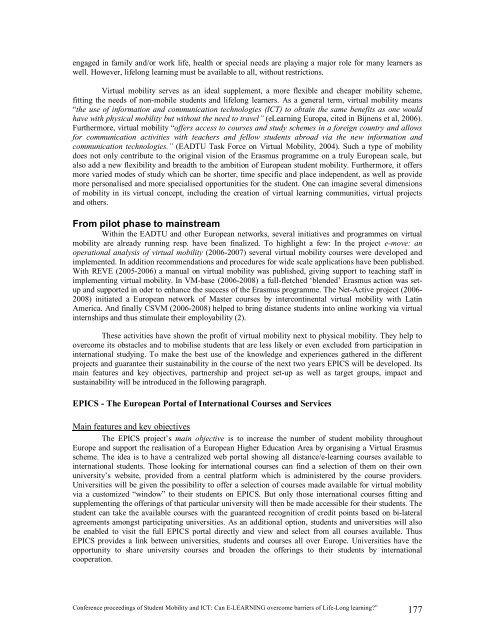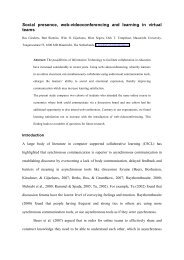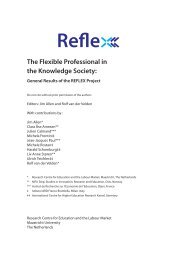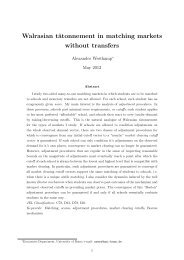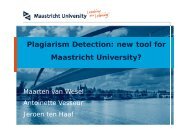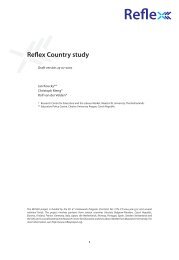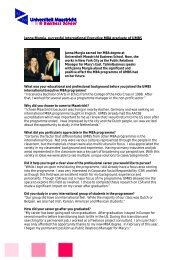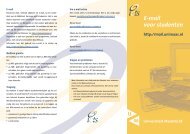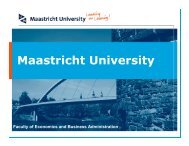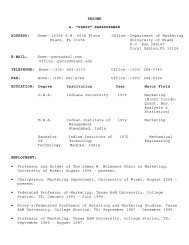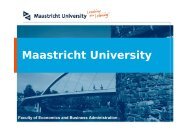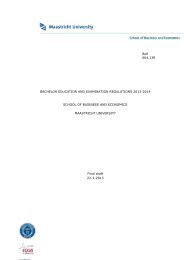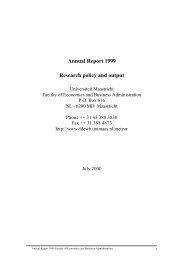proceedings of Student Mobility and ICT: Can E-LEARNING
proceedings of Student Mobility and ICT: Can E-LEARNING
proceedings of Student Mobility and ICT: Can E-LEARNING
Create successful ePaper yourself
Turn your PDF publications into a flip-book with our unique Google optimized e-Paper software.
engaged in family <strong>and</strong>/or work life, health or special needs are playing a major role for many learners as<br />
well. However, lifelong learning must be available to all, without restrictions.<br />
Virtual mobility serves as an ideal supplement, a more flexible <strong>and</strong> cheaper mobility scheme,<br />
fitting the needs <strong>of</strong> non-mobile students <strong>and</strong> lifelong learners. As a general term, virtual mobility means<br />
“the use <strong>of</strong> information <strong>and</strong> communication technologies (<strong>ICT</strong>) to obtain the same benefits as one would<br />
have with physical mobility but without the need to travel” (eLearning Europa, cited in Bijnens et al, 2006).<br />
Furthermore, virtual mobility “<strong>of</strong>fers access to courses <strong>and</strong> study schemes in a foreign country <strong>and</strong> allows<br />
for communication activities with teachers <strong>and</strong> fellow students abroad via the new information <strong>and</strong><br />
communication technologies.” (EADTU Task Force on Virtual <strong>Mobility</strong>, 2004). Such a type <strong>of</strong> mobility<br />
does not only contribute to the original vision <strong>of</strong> the Erasmus programme on a truly European scale, but<br />
also add a new flexibility <strong>and</strong> breadth to the ambition <strong>of</strong> European student mobility. Furthermore, it <strong>of</strong>fers<br />
more varied modes <strong>of</strong> study which can be shorter, time specific <strong>and</strong> place independent, as well as provide<br />
more personalised <strong>and</strong> more specialised opportunities for the student. One can imagine several dimensions<br />
<strong>of</strong> mobility in its virtual concept, including the creation <strong>of</strong> virtual learning communities, virtual projects<br />
<strong>and</strong> others.<br />
From pilot phase to mainstream<br />
Within the EADTU <strong>and</strong> other European networks, several initiatives <strong>and</strong> programmes on virtual<br />
mobility are already running resp. have been finalized. To highlight a few: In the project e-move: an<br />
operational analysis <strong>of</strong> virtual mobility (2006-2007) several virtual mobility courses were developed <strong>and</strong><br />
implemented. In addition recommendations <strong>and</strong> procedures for wide scale applications have been published.<br />
With REVE (2005-2006) a manual on virtual mobility was published, giving support to teaching staff in<br />
implementing virtual mobility. In VM-base (2006-2008) a full-fletched ‘blended’ Erasmus action was setup<br />
<strong>and</strong> supported in oder to enhance the success <strong>of</strong> the Erasmus programme. The Net-Active project (2006-<br />
2008) initiated a European network <strong>of</strong> Master courses by intercontinental virtual mobility with Latin<br />
America. And finally CSVM (2006-2008) helped to bring distance students into online working via virtual<br />
internships <strong>and</strong> thus stimulate their employability (2).<br />
These activities have shown the pr<strong>of</strong>it <strong>of</strong> virtual mobility next to physical mobility. They help to<br />
overcome its obstacles <strong>and</strong> to mobilise students that are less likely or even excluded from participation in<br />
international studying. To make the best use <strong>of</strong> the knowledge <strong>and</strong> experiences gathered in the different<br />
projects <strong>and</strong> guarantee their sustainability in the course <strong>of</strong> the next two years EPICS will be developed. Its<br />
main features <strong>and</strong> key objectives, partnership <strong>and</strong> project set-up as well as target groups, impact <strong>and</strong><br />
sustainability will be introduced in the following paragraph.<br />
EPICS - The European Portal <strong>of</strong> International Courses <strong>and</strong> Services<br />
Main features <strong>and</strong> key objectives<br />
The EPICS project’s main objective is to increase the number <strong>of</strong> student mobility throughout<br />
Europe <strong>and</strong> support the realisation <strong>of</strong> a European Higher Education Area by organising a Virtual Erasmus<br />
scheme. The idea is to have a centralized web portal showing all distance/e-learning courses available to<br />
international students. Those looking for international courses can find a selection <strong>of</strong> them on their own<br />
university’s website, provided from a central platform which is administered by the course providers.<br />
Universities will be given the possibility to <strong>of</strong>fer a selection <strong>of</strong> courses made available for virtual mobility<br />
via a customized “window” to their students on EPICS. But only those international courses fitting <strong>and</strong><br />
supplementing the <strong>of</strong>ferings <strong>of</strong> that particular university will then be made accessible for their students. The<br />
student can take the available courses with the guaranteed recognition <strong>of</strong> credit points based on bi-lateral<br />
agreements amongst participating universities. As an additional option, students <strong>and</strong> universities will also<br />
be enabled to visit the full EPICS portal directly <strong>and</strong> view <strong>and</strong> select from all courses available. Thus<br />
EPICS provides a link between universities, students <strong>and</strong> courses all over Europe. Universities have the<br />
opportunity to share university courses <strong>and</strong> broaden the <strong>of</strong>ferings to their students by international<br />
cooperation.<br />
Conference <strong>proceedings</strong> <strong>of</strong> <strong>Student</strong> <strong>Mobility</strong> <strong>and</strong> <strong>ICT</strong>: <strong>Can</strong> E-<strong>LEARNING</strong> overcome barriers <strong>of</strong> Life-Long learning?” 177


